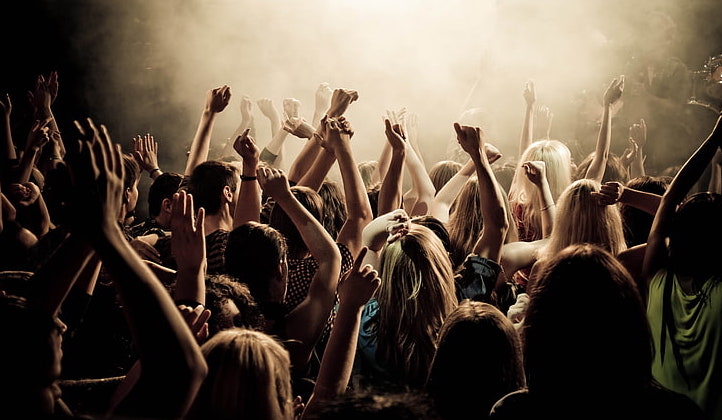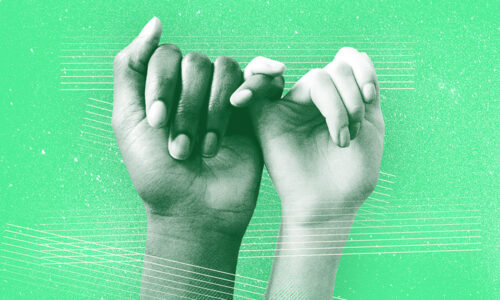22 October 2021
It begins, not with music, but with words. There’s the band name, a date, a venue you recognise. And you stop – stop scrolling social media, stop walking by the poster, stop and turn the radio up, because those chemicals have started firing –
– because dopamine, lovely neurotransmitter dopamine, the chemical in the brain responsible for feelings of pleasure and reward, is triggered even by simply anticipating the experience of music.
Symphony X, or Band Y, or Violinist Z has been parachuted into your mind, and even the thought of listening to them is making you feel good. So, why not simply put the album on? You can listen to it wearing unwashed tracksuit bottoms, drink an entire bottle of wine with no judgement, and it doesn’t matter what the weather’s doing or whether you can get a babysitter.
Well, it’s not the same, is it.

Discovering something new
Recorded music is surely one of the most cherished technological achievements in our history. Take a second to imagine a life without it and you’re looking at an entirely different existence, mentally, emotionally and physically –
– because music activates every known part of the brain, including areas responsible for motor actions, emotions and creativity. It helps to reduce levels of stress hormones, and increases production of immunoglobulin A, an antibody that plays an important role in immunity, and helps to protect against cognitive and mental decline.
One of the most beautiful things about it is that even the most well-worn album offers the possibility of a new response each time we listen – something many of us may have discovered during lockdown. You hear a chord progression in a new way; a lyric presents a new meaning; an overtly chipper piece makes us feel a sharp twist of depression.
– because studies have shown that listening to music that matches your mood can also be helpful in releasing emotional tension; people experiencing depression actually tend to feel better when listening to sad music.
What we cannot have is a response to anything but that one captured performance of them – which is fine, but which misses out on an entire dimension of enjoyment that live music gives us: what we witness is something entirely new. Spontaneity, novelty, surprise, and a feeling of present and future: it’s no wonder we missed it so much during those long stagnant months behind us.
Discovering something human
It’s quite subtle, when you think about it, but we tend to experience music as having been made by someone – and we like it. A robot programmed to perform an improvised piece modelled on a Bach partita, say, may well produce something emotionally compelling thanks to, you guessed it, science –
– in fact, different brain circuits are active in both the ‘anticipation’ and ‘achievement’ phases of music: specifically, the caudate is more involved during the anticipation of hearing music, and the nucleus accumbens is activated during your peak emotional response. This helps to explain why experiencing tension followed by resolution – G major arriving home at C major, that physically-felt release of pressure as a dance track ‘drops’ – is so universally satisfying.
But, finding out that it hadn’t been written, or performed, by a fellow human, we might feel we’d been tricked. It might feel hollow, false, somehow lacking – and our enjoyment of it would diminish.
Attendance numbers attest to the chasm in popularity between classical and ‘popular’ music: perhaps significantly, the latter is immediately, often deliberately, associated with the human(s) delivering it. Sometimes a carefully-constructed, perfectly-marketed simulacrum of the real human being behind it, if we’re being cynical, but one designed for us to feel a connection to, nonetheless. The dry collective noun of the orchestra, by comparison, can too easily appear a mere vessel for delivering sound.
But the reality is that in either case, when we witness anyone performing music live, alone or as part of a group, we’re witnessing them express something of themselves – because it would simply be impossible not to.
Even the most controlled, note-perfect performances are the product of a series of idiosyncratic chemical reactions, feelings and micro-experiences leading up to that moment, filtered through the porous vulnerability and fallibility of a sentient being.
Woven into the intonation of those familiar lyrics, in the ferocity or gentleness with which they beat that bass drum pedal, is a part of themself. And, in a world increasingly made up of carefully controlled personas, it feels like we’re becoming increasingly hungry for realism, for authenticity, from the superficial to the profound: witnessing the human is to feel more human ourselves.
Discovering something communal
From the moment you buy that ticket, you are immediately yet intangibly connected to a group of people you have never met. Across the city, country, even globe, people you’d never be likely to meet – but who, crucially, share your love for Symphony X, or Band Y, or Violinist Z – are embarking upon the same delicious process of anticipation.
Whether intentionally or not, you’ve become part of something communal. And, it probably doesn’t need any science asides to explain why this is so attractive, so vital to us as human beings. In a world in which loneliness literally kills, in which people are made to feel alienated, isolated, disconnected and other, feeling connected to others has never been more important.
Denigrators of DJs often cite that they’re simply playing other people’s recorded music, and where’s the skill in that? But live DJing, perhaps even more so than some other musical performances (and it is a performance, using rhythm, tempo, timbre and key to construct a new musical creation) is built upon one of the most fundamental elements of live music. They respond to the audience – or, good DJs, anyway. Your response to the sounds shapes what comes next. And in doing so, you become part of a powerful shared experience: sounds, performer and listener are united, spatially, physically and emotionally.
The point being: the final step in our journey, that alchemical moment of connection, happens when we gather together.
Discovering everything at once
Back to our ticket.
On the day of the concert, you stick the well-worn album on, on your way to work. You love, love, that part where the singer’s voice breaks a little over that innocuous line in the second verse. You’ve always wondered about the meaning behind it, what it signified. Your brain starts to drift – but then, here’s your stop. Headphones are jostled out of ears, music out of mind, as the worries and stresses of the day, superficial and profound, bossily take hold –
– but, it’s OK, because today you have something to counteract all that. You made a commitment, when you bought that ticket, to setting time aside. Time to be distracted. To experience something above the mundanities of your day. To address a bubbling need to feel something different, witness something entirely new. To finally, properly, delve into the confusing emotions that Symphony X always seems to bring up in you, but which you’re always somehow too hesitant, too nervous, too busy to look in the eye.
Across the city, your invisible tribe is feeling the same.
And then you’re there, and they’re visible and real, queuing beside you at the bar and edging by you to get to their seat and clapping just like you as the performers come on stage and it’s impossible not to feel in some way part of something larger than yourself, which is strange because you don’t feel this when you’re in Tesco’s or on the bus –
– because listening to music together increases levels of oxytocin, a neuropeptide which encourages bonding and trust between people. Music also activates the mental circuit that helps us to understand what others are thinking and feeling, and to predict how they might behave. It’s a social skill scientists call “theory of mind”, which is linked to being able to empathise with others.
And, the singer’s voice doesn’t break over that line – instead, he snarls through it, furiously. You’ll probably never know why, but it doesn’t matter. Something has been shared, between him and you and the people roaring or singing or nodding along in the crowd, two thousand unique responses.
And, at the end, you stand side-by-side and smash your palms together, a tribalism without violence, to wordlessly show your delight and appreciation not only of the music but of the fact that other people feel the same way you do –
– because research shows that when we find out someone likes a piece of music we like, we tend to think better of them.
And you leave, into a night that feels transformed, inextricably connected with the world, and permanently changed.
